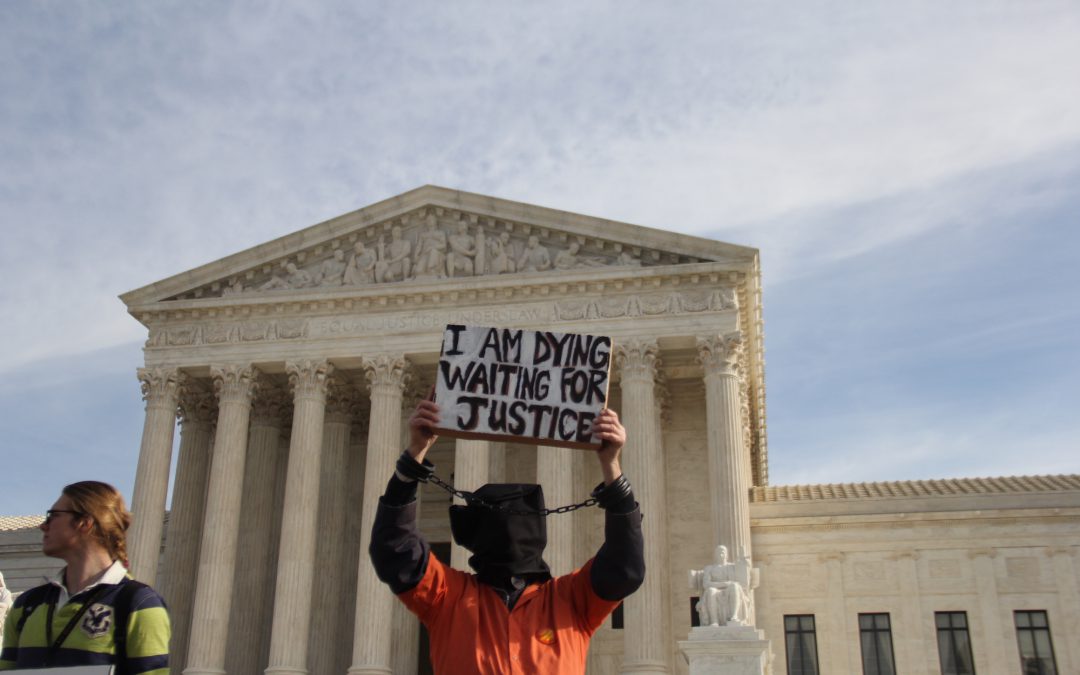By Shahzeb Ahmed
WASHINGTON – Attorneys in a long-standing civil rights lawsuit argued Wednesday before the Supreme Court that former Attorney General John Ashcroft and other high-level Bush administration officials should be held accountable for “unlawful policies” that resulted in the detention of over 700 Muslim immigrants following the 9/11 attacks in 2001.
The civil rights case, which began as a class action lawsuit in 2002, also names former FBI director Robert S. Mueller III; James Ziglar, the former commissioner of the Immigration and Naturalization Service, and James Sherman, associate warden of the Metropolitan Detention Center in Brooklyn, N.Y., among others, for discriminating against the plaintiffs and mistreating them in violation of the Constitution.
“If individuals who are the subject of clearly unconstitutional national security policy don’t even have the opportunity to get into the court, then there is nothing to deter even more excessive exercises of government power in the future,” said Rachel Meeropol, who represents the eight plaintiffs in the case.
Ashcroft’s counsel, Acting Solicitor General Ian Heath Gershengorn argued that the plaintiffs had not alleged that Ashcroft, Ziglar or Muller were directly responsible for the “punitive conditions.” Instead, he said, Ashcroft had a list of persons “of interest,” all of whom were aliens and unlawful immigrants and that he believed the conditions of confinement were acceptable at the time. For that reason, the attorney said, Ashcroft ordered that the men be detained until cleared by law enforcement agencies.
Conditions at the detention center were, however, far from humane, according to a December 2003 report compiled by the inspector general’s office at the Justice Department. The report found that throughout their detention, the defendants were confined for 23 hours a day in tiny, brightly lit cells for up to eight months, denied access to attorneys or anyone else, arbitrarily and abusively strip-searched, subjected to sleep deprivation and interference with religious practice, denied basic personal items like soap and toilet paper, and given “meager and barely edible” food. The report also said that staff and guards verbally and physically abused the plaintiffs.
Associate Justice Stephen G. Breyer asked Gershengorn, Ashcroft’s attorney, whether the length of confinement was justified. “So I can understand after a bomb attack… that the first reaction of the law enforcement is, pick up anybody you think is connected we’ll worry about the rest of it later,” Breyer said. “Now, eight months?” he asked, noting that the plaintiffs had alleged that Ashcroft and Mueller ordered they be kept in custody, even though there was no evidence linking them to terrorism. Gershengorn said that Ashcroft decided at the time to hold the detainees until they were cleared by law enforcement agencies.
Meeropol, representing the detainees, said, the plaintiffs were also focusing on the conditions of their confinement. “We don’t challenge the fact that these men were detained at all,” she said. “And we don’t challenge that they were investigated while they were detained. The challenge is to the way they were treated while they were detained,” she told the court, adding that there were plenty of resources at the government’s disposal to conduct their investigations. “What you cannot do is single out a group of people [when] there is no basis to suspect them of any ties to terrorism beyond sharing racial and religious characteristics with the 9/11 hijackers,” she added.
The Supreme Court decision may be judged in the context of a 1971 precedent, the so-called Bivens case, in which the court recognized an implied right of action against federal officials. For this case to fall under that precedent, however, the plaintiffs would have to prove that the defendants were directly responsible for the unconstitutional conduct. The justices also will deliberate whether the defendants are protected by the doctrine of qualified immunity, which grants immunity to government officials if no clearly established rights have been violated. The plaintiffs, in this case, claim their constitutional as well as civil rights were violated by the defendants’ actions.
The court will also consider whether the defendants are to be held directly responsible for these violations. The case is being heard by only six of the eight Supreme Court justices. Justices Elena Kagan and Sonia Sotomayor recused themselves from the case.
Meeropol told the court the defendants drafted the “unlawful policy” and were directly responsible and knowledgeable of its execution. In the end, she said, the underlying policy was “a blunderbuss attempt to gather all of the Muslim and Arab noncitizens whom one has authority over by virtue of their immigration detentions,” she said.

